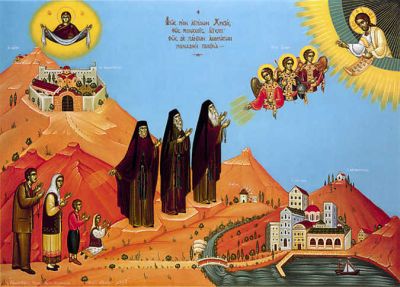
TLTR: start with "lives of saints", after that "The Evergetinos", after that "The Philokalia"
Besides a Spiritual Guide, the reading of edifying Orthodox works, or listening to others read such works, is of great value throughout one’s journey on the spiritual path. It was hearing a Gospel reading in the church of his village, and taking it in all seriousness, that revolutionized St. Antony’s [the Great] life when he was a youth. To all such readings he listened very attentively and applied their lessons to himself.
Regarding this, in his biography of him, St. Athanasios says: “He (St. Antony) gave such heed to what was read that none of the things that were written fell from him to the ground, but he remembered all, and afterwards his memory served him for books.”
The Gospels have always occupied an especially important place in Orthodox life. A select passage is read from one of the Gospels at every Divine Liturgy, and often the reading is followed by a sermon on it. At Mount Athos, where there is a Liturgy every day, a Gospel excerpt is read in the church. In addition, many monks there and elsewhere make reading the Gospels part of their private reading. St. Seraphim of Sarov, the most popular of Russian saints, is known to have included in his daily reading parts of the Gospels.
In this and in other things Orthodox monks provide lessons for those in the “world” who aspire for spiritual development. This statement is consonant with the following saying of St. John Climacos, one of the great masters of the spiritual life: “Angels are the light of monastics, while the monastic way of life is a light for all men.”
Great value for the striver is also ascribed by the holy men of Athos to reading (a) the lives of saints, (b) The Evergetinos, and (c) The Philokalia. Once I asked a saintly monk, the hermit Gabriel who dwelt at Karoulia—the most secluded and inaccessible region of the Holy Mountain—whether he recommended The Philokalia to persons like me who live in the “world.” He replied: “The Philokalia is an excellent work, but it is for those advanced in the spiritual life. To use an analogy, it is ‘university education.’ First, one has to go to ‘grammar school,’ next to ‘high school,’ and only then is he ready to go to a ‘university.”
“Should one start with The Evergetinos?” I asked.
“No,” he replied. “this, too, is advanced. It is ‘high school.’ One must start with something more elementary. One should read simple lives of saints, in order to learn what kind of persons they were, how they lived, and what they did. Then one can proceed to the higher steps.”
Manifest in these statements of Father Gabriel is the idea of stages in the path of one’s “beautiful change.” These stages or levels of understanding spiritual writings corresponds to the three stages of spiritual growth that I mentioned earlier: those of the “beginner,” of the “intermediate,” and of the “perfect.”
For each of these levels of spiritual development a different kind of mental food is particularly suitable: food that is digestible and assimilable by a person at that level. Such food provides sustenance to the soul of one who partakes of it, and promotes his advancement.
Clearly, there is food for the soul just as there is food for the body. Christ Himself stressed the existence of these two kinds of food when He said: “Man shall not live by bread alone [which is food for the body], but by every word that proceedeth out of the mouth of God” [which is food for the soul] (Matthew 4:4).
St. Paul points out that for beginners in the spiritual life the spiritual food that is to be provided has to be different from that of those who have grown spiritually. It is the same as in the case of the body. For the physical babe, the food that is suitable is physical milk. Similarly, for the spiritual babe: “spiritual milk” is needed; whereas for the spiritual adult solid food is proper. Thus, the Apostle writes to the Corinthians: “I have fed you with milk, and not with solid food: for hitherto ye were not able to bear it, neither yet are ye able, for ye are yet carnal” (1 Corinthians 3:2). And writing to the Hebrews, he says: “Ye have need that one teach you again the elements (stoicheia) of God’s word; and are become such as need milk, not solid food. For every one that needeth milk is unskilled in the word of righteousness: for he is a babe. But solid food is for the mature (teleioi), for those who have their faculties trained to distinguish good from evil” (Hebrews 5:12-14).
Relating these points to the statements made by the Athonite hermit Gabriel, we may say that simple lives of saints are “pure spiritual milk for spiritual babes;” the Evergetinos is a kind of mixed fare, comprising both spiritual milk and solid spiritual food; while the Philokalia provides only “solid food.
